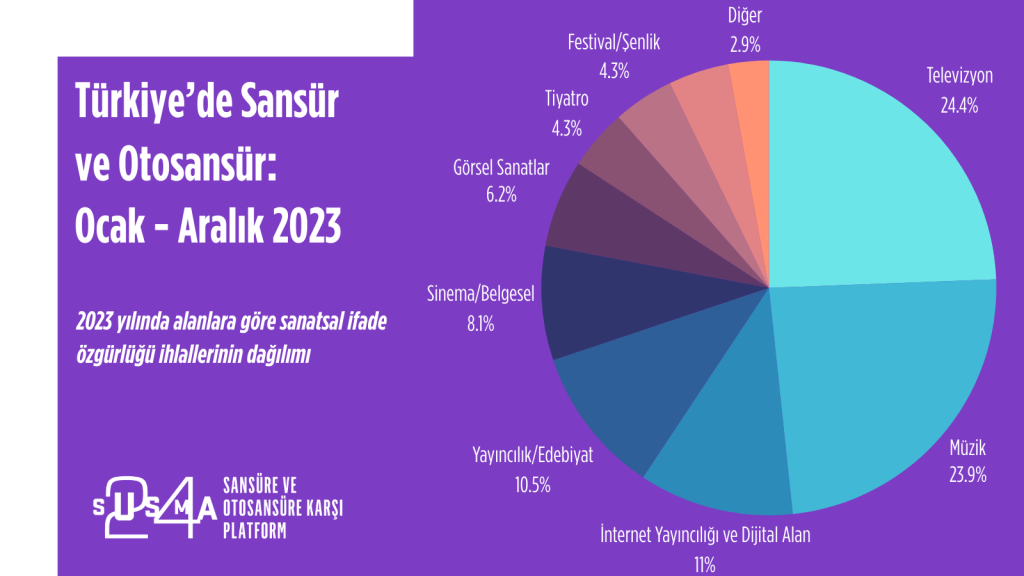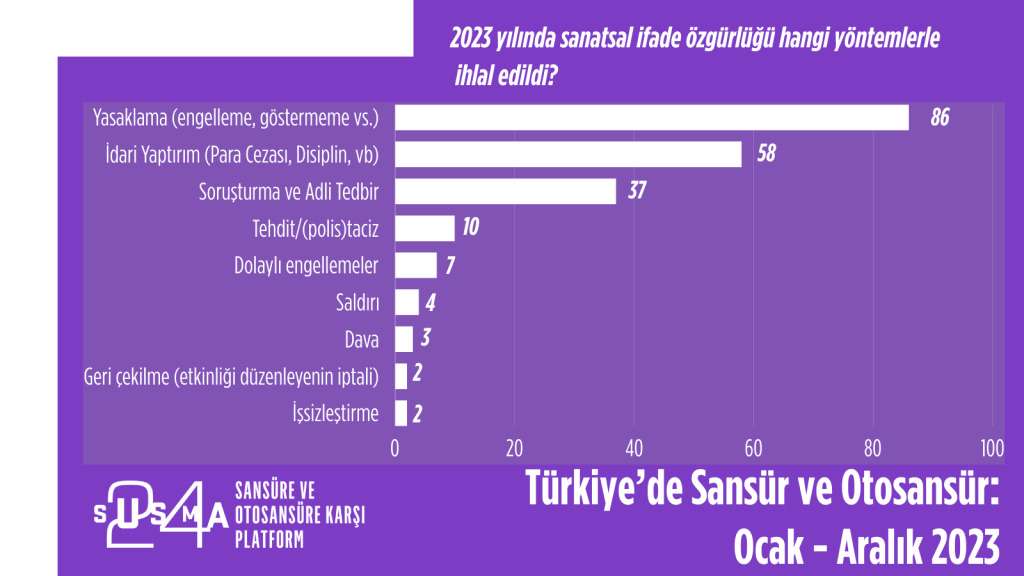Speak Up Platform releases 2023 monitoring report
Speak Up’s annual report sheds light on extent of censorship and self-censorship across culture and media industries
27.03.2024
Speak Up Platform’s latest annual report showcases the extent of the government’s censorship across the media and culture industries. Released earlier this week, the report is a testimony of how legally autonomous public regulators routinely suppress free speech, aligning with the government’s stance on issues such as women’s and LGBTI+ rights, the Kurdish language, and refugees.
According to Speak Up Platform’s monitoring work, TV broadcasts account for almost a quarter of the cases. Of the 51 cases of censorship tallied by Speak Up, 42 were due to the Radio and Television Supreme Council’s (RTÜK) intervention. The music industry follows closely behind, with censorship cases rising every year. Digital publishing and news media were severely affected, with access to URLs blocked or court decisions ordering website owners to take down their online content.

The diagram shows the percentage of cases distributed by industry according to Speak Up’s monitoring. TV broadcasts were censors’ primary target, with the music industry following very closely behind.
In the publishing industry, the Committee for the Protection of Minors from Harmful Publication adopted some of the most publically denounced decisions. The committee, which does not typically ban the publication of a book, has the authority to rule that specific books can only be sold with their covers kept hidden in envelopes, undermining their promotion and circulation. Those include gender-positive children’s books (Christine Baldacchino’s Morris Micklewhite and the Tangerine Dress), young adult books (Alice Oseman’s Heartstopper series), and even novels that have been on the shelves for more than twenty years (Jeanette Winterson’s classic, Sexing the Cherry).
According to Speak Up’s data, official bans -such as preventing access to content or refusing to allow a public event to be organized- have been the primary tool through which authorities have intervened. Second were administrative or disciplinary fines, tools particularly resorted to by the Radio and Television Supreme Council. The third category was investigations and court cases. The monitoring reveals that recurring offenses imputed by prosecutors include “organized crime,” “insulting the president,” and “inciting the people to hatred and enmity.”

This graphic shows the primary methods used to censor the publication of content or to prevent events from being organized. Direct bans led to 86 cases, followed by administrative fines, which resulted in 58 cases. Prosecutions and legal decisions have accounted for 37 cases. Using tactics such as threats, intimidation, attacks, or disemployment may seem less frequent, but they are also much more challenging to unveil and tally.
A hidden effect: self-censorship
Over the years, Speak Up Platform’s monitoring work showed that censorship has become the norm in Turkey and is expected when people exert their free speech on specific causes such as the Kurdish issue or LGBTI+ rights. This has made self-censorship also increasingly well-established and deep-rooted in Turkish society.
Unlike censorship, self-censorship cannot be accounted for. However, the relatively scarcer censorship cases in the filming industry, theater, and contemporary art can be considered a sign that bans and prosecutions are forbidding artists and promoters alike from adopting an overtly political approach. The report’s in-depth articles for each sector, as well as Speak Up Platform’s new podcast series, “Sessizlik Halleri / States of Silence,” probe into the taxing effect of the environment of censorship on culture workers and artists. If the report is a compelling overview of the gravity of censorship in Turkey, further qualitative research will show how profound its effects are on free speech.
A positive note is the willingness shown by stakeholders to participate in the debate on ensuring conditions that would strengthen society against censorship. Leaning on the heightened awareness about the necessity for collective action, Speak Up Platform will continue to engage in advocacy work, bringing together all the stakeholders directly or indirectly affected by censorship and its effects.
